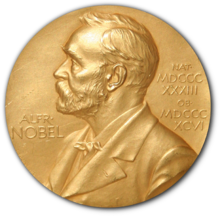
Back Nobelprys vir fisika Afrikaans Nobelpreis für Physik ALS Premio Nobel de Fisica AN جائزة نوبل في الفيزياء Arabic جايزة نوبل فى الفيزيا ARZ Premiu Nobel de Física AST Fizika üzrə "Nobel" mükafatı Azerbaijani Нобелеўская прэмія па фізіцы Byelorussian Нобэлеўская прэмія ў галіне фізыкі BE-X-OLD Нобелова награда за физика Bulgarian
| Nobel Prize in Physics | |
|---|---|
 | |
| Awarded for | Outstanding contributions to mankind in the field of physics |
| Location | Stockholm, Sweden |
| Presented by | Royal Swedish Academy of Sciences |
| Reward(s) | 11 million Swedish kronor (2023)[1] |
| First awarded | 1901 |
| Last awarded | 2024 |
| Most recently awarded to | John Hopfield and Geoffrey Hinton |
| Most awards | John Bardeen (2) |
| Website | nobelprize.org/physics |

The Nobel Prize in Physics (Swedish: Nobelpriset i fysik) is an annual award given by the Royal Swedish Academy of Sciences for those who have made the most outstanding contributions to mankind in the field of physics. It is one of the five Nobel Prizes established by the will of Alfred Nobel in 1895 and awarded since 1901, the others being the Nobel Prize in Chemistry, Nobel Prize in Literature, Nobel Peace Prize, and Nobel Prize in Physiology or Medicine. Physics is traditionally the first award presented in the Nobel Prize ceremony.
The prize consists of a medal along with a diploma and a certificate for the monetary award. The front side of the medal displays the same profile of Alfred Nobel depicted on the medals for Physics, Chemistry, and Literature.
The first Nobel Prize in Physics was awarded to German physicist Wilhelm Röntgen in recognition of the extraordinary services he rendered by the discovery of X-rays. This award is administered by the Nobel Foundation and is widely regarded as the most prestigious award that a scientist can receive in physics. It is presented in Stockholm at an annual ceremony on the 10th of December, the anniversary of Nobel's death. As of 2024[update], a total of 226 individuals have been awarded the prize.[2]
- ^ "The Nobel Prize amounts". The Nobel Prize. Archived from the original on 20 July 2018. Retrieved 29 September 2023.
- ^ "All Nobel Prizes in Physics". The Nobel Foundation. Archived from the original on 25 July 2018. Retrieved 3 October 2023.